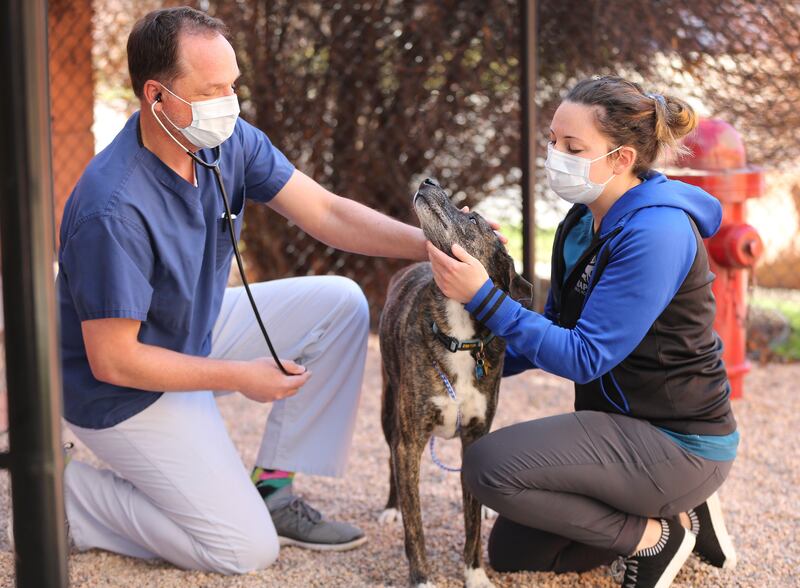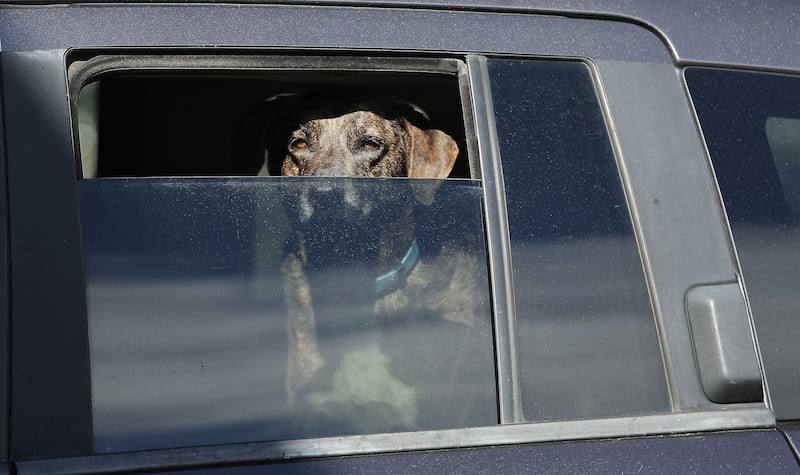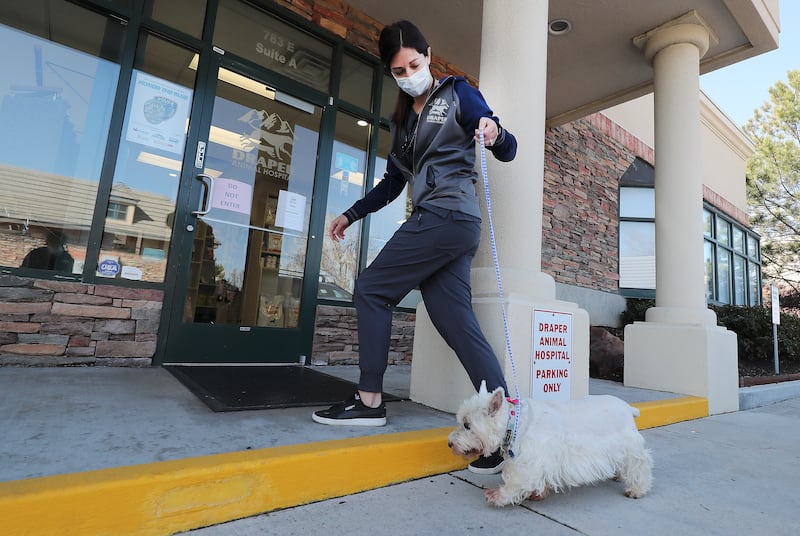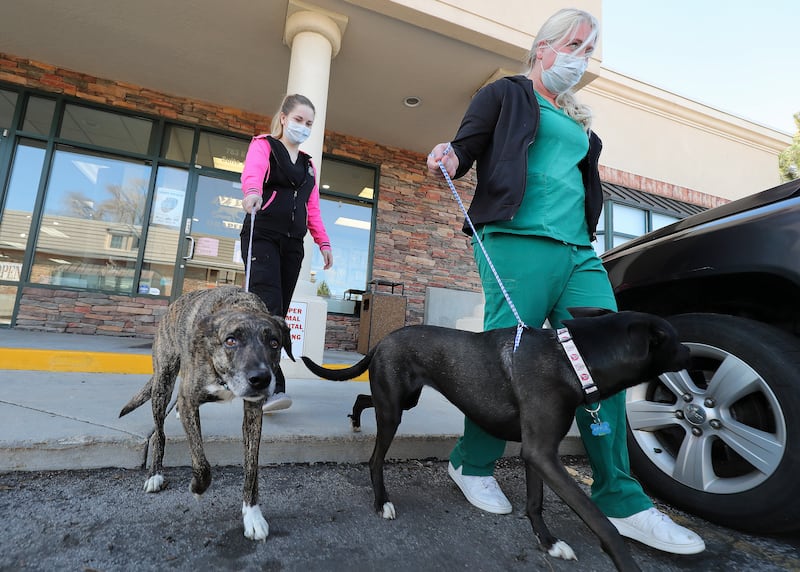SALT LAKE CITY — There is something to be said for the blissful ignorance of dogs. As the novel coronavirus kills hundreds more people every day, forcing humans to spend more time in their homes, dogs couldn’t be happier.
More walks. More chasing after a ball. More food falling to the kitchen floor as their owners spend more time standing over their stoves. But what Fido doesn’t know is that his health care has also been compromised as human and animal medical professionals try to preserve critically important equipment needed to test and treat the coronavirus patients.
Although the coronavirus isn’t making pets sick, public health officials across the country have ordered that nonessential medical procedures — including those for pets and animals — be postponed to to conserve personal protective equipment (PPE) for medical professionals and to ensure pet owners maintain social distancing.

Last Monday, Utah Department of Health Executive Director Dr. Joseph Miner order that all elective surgeries and procedures be postponed. The order went into effect just after midnight that Wednesday.
State Veterinarian Dr. Dean Taylor sent a letter explaining that the order also applied to animal health practices.
“Veterinarians have been directed to discontinue nonessential services that require the use of personal protective equipment that is in critically short supply, and they have been requested to donate this equipment to medical professionals combating this pandemic,” Taylor told Deseret News.
Essential services for animal health care — which includes emergency care, diagnostic services, and the protection of the state’s food supply — would remain available as the state began to shut down business and recreation.
“I would like the public to know that veterinarians will still be able to provide for their animals’ critical needs and ask their patience as nonurgent procedures are rescheduled,” the state veterinarian said.
But what is a medical emergency for your pet?

Pet triage
According to Dr. Eric Chapman, veterinarian and owner of Salt Lake City’s Draper Animal Hospital, all health care is essential.
“In my feeling, nonurgent, noncritical, nontime sensitive,” Chapman said, is a way to understand what veterinary appointments and procedures can be delayed during the pandemic. Outside of those “nons,” animals still need to be seen by a veterinarian.
Unlike doctors who treat humans, veterinarians must diagnose their animal patients without being able to ask, where does it hurt? Cats are unable to describe that itch behind their ear and Fido can’t cop to eating the sock that is now causing a life-threatening bowel obstruction.
The American Veterinary Medical Association suggests 13 different emergencies that pet and animal owners can identify which would require immediate care or consultation for a veterinarian. Those are:
- Severe bleeding or bleeding that doesn’t stop within five minutes.
- Choking, difficulty breathing or nonstop coughing and gagging.
- Bleeding from nose, mouth, rectum, coughing up blood, or blood in urine.
- Inability to urinate or pass feces (stool), or obvious pain associated with urinating or passing stool.
- Injuries to your pet’s eye(s).
- You suspect or know your pet has eaten something poisonous (such as antifreeze, xylitol, chocolate, rodent poison, etc.).
- Seizures and/or staggering.
- Fractured bones, severe lameness or inability to move leg(s).
- Obvious signs of pain or extreme anxiety.
- Heat stress or heatstroke.
- Severe vomiting or diarrhea — more than two episodes in a 24-hour period, or either of these combined with obvious illness or any of the other problems listed here.
- Refusal to drink for 24 hours or more.
- Unconsciousness.
The list from AVMA — a national standard-making organization for veterinarians — is a good start, but not totally inclusive for pet emergencies, veterinarians say.
Rural Ohio veterinarian Dr. Catherine Stoner said she would add a few others.
Ear and skin infections that cause an animal to aggressively scratch itself should also be considered emergencies, said Stoner, or “Dr. Cat” as she’s known to her clients at the Fredericktown Veterinary Clinic. Ohio — which has a little more than twice as many coronavirus cases as Utah — also ordered that the cancelation of all nonessential surgeries and procedures, starting March 18.
“While it’s not an emergency, it’s not something we want to have to delay,” Stoner said, as scratching can cause open sores which lead to other more serious problems.
She also recommended that puppies continue to get vaccinated, which can prevent the spread of other diseases like the canine parvovirus — or parvo.
Veterinary pathologist Dr. David Gardiner, a spokesman for the Utah Veterinary Medical Association — Utah’s analog to the AVMA — agreed. “Puppy shots are critical,” he said, adding that it is acceptable to delay a booster for an healthy, adult dog during during the outbreak.
Gardiner also recommended that infections be treated without delay.
Nonurgent procedures include spaying and neutering, dental cleaning and annual wellness appointments for healthy pets.
If Fido injuries his leg while retrieving at a ball at park, veterinarians say it’s OK to call and ask about an injury, but they may not be able to do much if the sore dog is still getting around and the injury isn’t serious. If the the pet or animal’s ailment isn’t life-threatening, causing great discomfort, or critical in nature, the procedure should be postponed, Taylor said.

Preserving PPE
Postponing nonessential procedures is intended to save short supplies of PPE for a human health care system that is struggling to treat COVID-19 patients and protect its own.
“We’re all in this together,” Chapman said.
Both surgeries and routine procedures like dental cleaning require veterinarians and their assistants to use PPE. Gloves, masks and gowns are worn to prevent the spread of bacteria splashed around by dental tools.
Veterinary clinics often order surgical masks, gloves, gowns and other medical supplies from the same vendors used by hospitals, Gardiner said. It would be devastating to find out that masks were unavailable for a nurse treating a coronavirus patient when they’re stockpiled at a veterinary clinic down the street, he added.
State officials have requested that PPE be donated to local hospitals struggling to keep their own shelves stocked with critically important protective equipment and medical supplies.
Stoner said a nearby rural hospital had already reached out to request any PPE and hand sanitizer the clinic could spare. Veterinary clinics tend to run lean on supplies, she said, but the clinic sent over a box of gloves, booties, head covers and single-use PPE kits.
The hard truth is pet care comes second to human care when medical supplies run low.
Together in the end
As states lock down to slow the spread of the virus, some veterinary clinics have stopped allowing owners to join their pets in the waiting or exam room.
Chapman’s Draper Animal Hospital closed its doors to all humans — except staff — on March 16, a week ahead of Utah’s order. The hospital has reduced the number of appointments to accommodate a smaller staff and promote social distancing among owners, who can drop their pets off curbside.
Once Ohio ordered all nonessential medical procedures to be postponed, the Fredericktown Veterinary Clinic took similar measures, cleaning the facility even more frequently between appointments. Staff members meet clients at the door and use the clinic’s leashes to bring the pets inside, where they call the owners — who remain in the parking lot — to discuss symptoms and treatment options. Payment is also made over the phone and prescriptions are delivered curbside.
The animal health care workers wear street clothes to the clinic, change into scrubs at work and wash both linen and scrubs at the clinic before changing back into street clothes at the end of the day.
There is one exception to the new, no-humans-in-the-clinic rule, according to Stoner.
“Euthanasias are the only reason clients are allowed in the building because we want them to have the ability to be with their pets,” she said. As for PPE, the final procedure only requires a pair of gloves at most. “We don’t want to make it any more sterile than it has to be,” she said.
Clinic staff try to maintain a safe social distance while heartbroken owners say goodbye to their pets for the last time and no longer offer hugs to comfort them.
“But we are still crying with them,” Stoner said.



